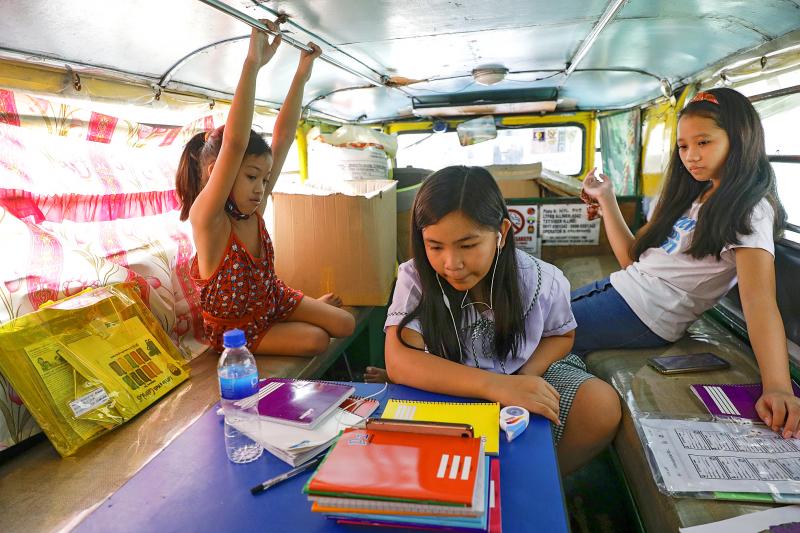Grade and high-school students in the Philippines yesterday began classes at home after the COVID-19 pandemic forced remote learning onto an educational system already struggling to fund schools.
The shift to distance-learning has been a logistical nightmare for the Southeast Asian nation that has long lacked enough classrooms, teachers and educational equipment.
A majority of families, especially from poor and rural communities, have opted to use government-provided digital or printed learning materials, which students read at home with the guidance of their parents or guardians before carrying out specified activities.

Photo: AP
Most lack computers and reliable Internet connections. Teachers answer questions by telephone.
The rest have opted for lessons online, or through regional radio and TV educational broadcasts.
“The system may not be perfect and there may be issues as we shift to flexible learning ... but we are confident that the Department of Education would address these challenges,” Philippine presidential spokesman Harry Roque said.
Philippine President Rodrigo Duterte has said that school classes should resume only when a COVID-19 vaccine has been made available, fearing classrooms could become infection hotspots.
The Philippines yesterday had reported 322,497 COVID-19 infections, the highest in Southeast Asia, with 5,776 deaths.

A fire caused by a burst gas pipe yesterday spread to several homes and sent a fireball soaring into the sky outside Malaysia’s largest city, injuring more than 100 people. The towering inferno near a gas station in Putra Heights outside Kuala Lumpur was visible for kilometers and lasted for several hours. It happened during a public holiday as Muslims, who are the majority in Malaysia, celebrate the second day of Eid al-Fitr. National oil company Petronas said the fire started at one of its gas pipelines at 8:10am and the affected pipeline was later isolated. Disaster management officials said shutting the

ACCESS DISPUTE: The blast struck a house, and set cars and tractors alight, with the fires wrecking several other structures and cutting electricity An explosion killed at least five people, including a pregnant woman and a one-year-old, during a standoff between rival groups of gold miners early on Thursday in northwestern Bolivia, police said, a rare instance of a territorial dispute between the nation’s mining cooperatives turning fatal. The blast thundered through the Yani mining camp as two rival mining groups disputed access to the gold mine near the mountain town of Sorata, about 150km northwest of the country’s administrative capital of La Paz, said Colonel Gunther Agudo, a local police officer. Several gold deposits straddle the remote area. Agudo had initially reported six people killed,

SUSPICION: Junta leader Min Aung Hlaing returned to protests after attending a summit at which he promised to hold ‘free and fair’ elections, which critics derided as a sham The death toll from a major earthquake in Myanmar has risen to more than 3,300, state media said yesterday, as the UN aid chief made a renewed call for the world to help the disaster-struck nation. The quake on Friday last week flattened buildings and destroyed infrastructure across the country, resulting in 3,354 deaths and 4,508 people injured, with 220 others missing, new figures published by state media showed. More than one week after the disaster, many people in the country are still without shelter, either forced to sleep outdoors because their homes were destroyed or wary of further collapses. A UN estimate

The US government has banned US government personnel in China, as well as family members and contractors with security clearances, from any romantic or sexual relationships with Chinese citizens, The Associated Press (AP) has learned. Four people with direct knowledge of the matter told the AP about the policy, which was put into effect by departing US ambassador Nicholas Burns in January shortly before he left China. The people would speak only on condition of anonymity to discuss details of a confidential directive. Although some US agencies already had strict rules on such relationships, a blanket “nonfraternization” policy, as it is known, has